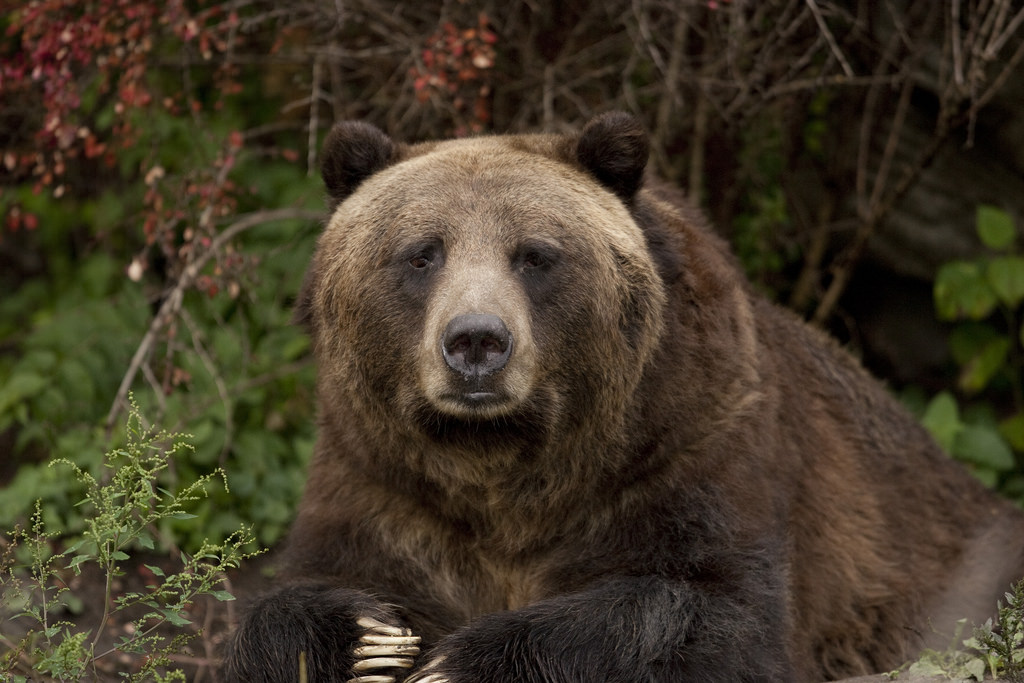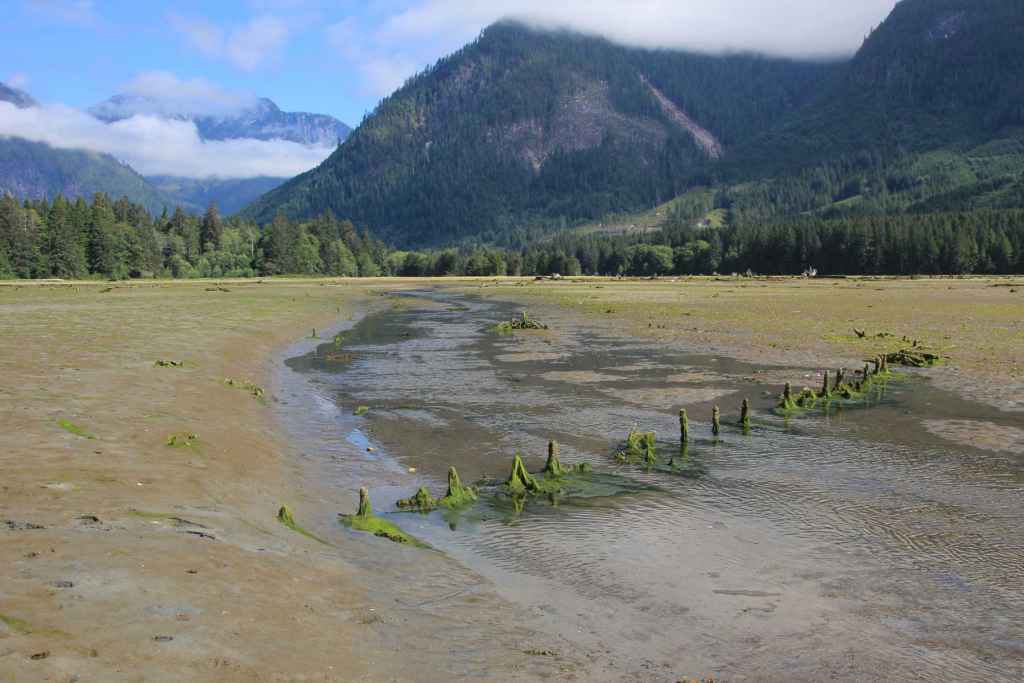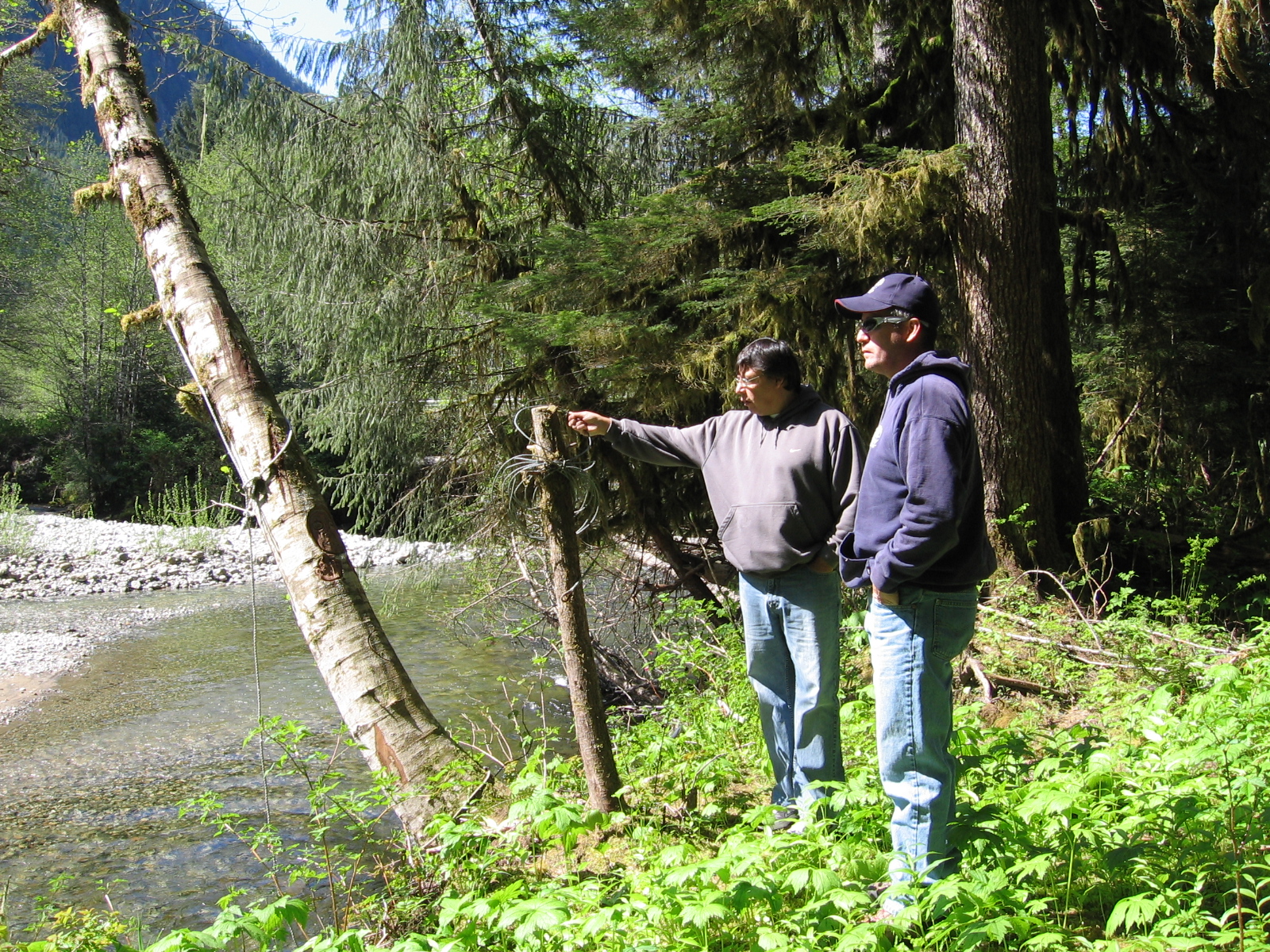Here’s a tale of how Christy Clark’s BC Liberals manage the province’s resources. It is set in the Great Bear Rainforest. Great, this story is not.
You’ll know some of the players: salmon, grizzly bears, B.C.’s stunning central coast, Western Forest Products, the BC Liberal government and a small First Nation, the Kwiakah (pronounced Kweekah).
And you’ll recognize the familiar downward trends. They include declining landscapes and battered watersheds, or what a group of retired resource managers recently described as “diminished investment by government” in the management of forests, fish, wildlife, and parks.
You’ll probably spot an enormous political lie, too.
Premier Christy Clark touted the Great Bear Rainforest agreement as “B.C.’s gift to the world.” But the Kwiakah will tell you otherwise, and they know because they live there.
The new agreement promises increased logging and reduced land protection on their traditional territory. While the northern part of the Great Bear might claim 54 per cent protection for old growth, the government decided to award the southern part only 30 per cent protection. The sacrifice comes directly from Kwiakah land.
How the remaining 70 per cent is logged — sustainably or rapaciously — is left to the timber corporations to decide because the BC Liberals made “self-regulation” the order of the day.
Where are the government scientists and other forestry experts who used to represent the public interest? Their ranks have been severely cut. Yet the Kwiakah were scorned by the same government for trying to hire independent scientists to protect their slice of the Great Bear Rainforest, which the world thinks has been forever preserved by those who run British Columbia.
Remnants of a warrior nation
With but 22 registered members, the Kwiakah are the second smallest of the province’s 198 First Nations. They have no electoral clout, and so the government ignores them.
But in the 17th century, the Kwiakah were known as fierce warriors who called home what is now named Phillips Arm Inlet on B.C.’s south coast. They paddled widely in the Salish Sea and at one time commanded Desolation Sound along with the other Laich-Kwil-Tach nations.
To this day, the remains of ancient villages, fish traps, and clam gardens speak to their title in Phillips Arm.
In the last three centuries, wars, European diseases, and the conquest reduced the nation’s numbers.
During the 1900s, most Kwiakah moved to Vancouver Island due to a paucity of social services on the coast as well as federal government restrictions on fishing in the inlet.
More than 10 years ago, the Kwiakah started to return to the Inlet only to find it vastly changed by industrial economic forces.
Industry clear-cuts dotted the watershed. Landslides triggered by logging sullied salmon streams and channels. Trophy hunters and loggers had reduced the grizzly bear population. A Marine Harvest fish farm occupied the mouth of the inlet without the Kwiakah’s permission.
More logging appeared imminent because vandalized landscapes, just like homes with broken windows, tend to invite more abuse.
“We didn’t know about these developments,” Chief Steven Dick of the Kwiakah told The Tyee recently. “We decided we should get a handle on it and try to take back control of the area.”
To help reassert their presence, the Kwiakah partnered with Sonora Resort and set up a grizzly bear viewing business on the inlet in 2007. The venture succeeded but is now imperiled by plans for more logging.
It is also threatened by the government’s reluctance to accept science on the region’s declining ecological health.
Not great for bears
At the same time the Kwiakah set up their eco-tourism business, they decided to collect more data on the health of the inlet.
To that end, they hired biologist Bristol Foster and then Wayne McCrory to begin a series of grizzly bear studies.
They did so after the B.C. government told them there were as many as 40 grizzly bears in the inlet. But based on what their bear viewing business saw, the Kwiakah thought that was a gross overestimate.
After several field visits to the region, McCrory established just how off base the government was. In the process, he also outlined a typical B.C. tragedy.
Thirty years of extensive industrial logging by the likes of MacMillan Bloedel, Weyerhaeuser, and Cascadia had hammered the old growth and the landscape.
A crude web of logging access roads totalling 306 kilometres combined with excessive clear cuts near waterways and destruction of salmon spawning areas had decimated the grizzly population.
McCrory concluded that only 10 to 12 bears remained in an inlet that once supported 50 to 60 bears.

Due to reduced old growth habitat and poor salmon runs, McCrory estimated the wounded landscape, once healed, could only support 20 to 30 bears, proving, once again, that the loss of old growth represents a dramatic loss of natural wealth.
The bear biologist also recommended a moratorium on further logging until the government had worked out a program to recover the bear and salmon ecosystem that sustained the Kwiakah and which, in turn, would energize the super natural beauty of coastal B.C.
Shocked by McCrory’s findings, the Kwiakah hired Ecofish Research to assess the impact of past logging on the area’s marine resources.
The researchers concluded that clear cuts had degraded salmon habitat for some species. They estimated that chum salmon and pink salmon survival rates in particular had been reduced by 40 per cent due to the high level of clear cuts and the way water flow had been changed on the land. Logging had also diminished fish nurseries such as eelgrass as well as clam production in the watershed. They recommended more studies.
Meanwhile, the frenzied cutting of hemlock, fir, and cedar continued. In 2007 Western Forest Products, the nation’s fifth largest logger by volume, acquired a major timber block (Block 5) in the heart of Kwiakah territory from Cascadia and then logged some 60,000 cubic metres.
Given a 2009 South Coast Land Use Order that recommended 70 per cent protection for the remaining old growth in the Phillips, Western Forest Products advised the Kwiakah that the region might get a break for the next 20 or 30 years.
But four years later, Western Forest Products changed its mind and proposed to log another 60,000 cubic metres over two years.
The Kwiakah said a two-year window didn’t make sense but tried to be reasonable. How about 75,000 cubic metres over a five-year period but all logged in one 16-month period so as to minimize the impact on their bear viewing business?
Just when it looked like a deal had been reached, the Kwiakah learned Western Forest Products had approached the government for an amendment in its management plan to log 400,000 cubic metres in the heart of their territory over a five-year period.
“We felt like we had just wasted years of negotiations,” said Chief Dick.
This stringing-along tactic has been given a name by groups in B.C. who’ve been victim to it over the decades: “log and talk.” The Kwiakah saw through it and took the position that the annual allowable cut for Block 5 should be reduced to zero as the only way to “prevent the loss of their Aboriginal rights and the enjoyment of the economic aspects of their Aboriginal title.”
At the same time, the Kwiakah presented the scientific evidence on the industrial degradation of Phillips Arm to the ever-smiling Clark government.
Not surprisingly, no one in the Clark government wanted to read reports by McCrory or Ecofish because they documented how clear cuts had eroded soils, accelerated bank erosion, and clouded streams with sediment.
Yet the same government championed the downloading of most forestry science to professionals working for corporations — a practice known as “professional reliance.”
Clark’s government even defined the term as “the practice of accepting and relying upon the decisions and advice of professionals who accept responsibility and can be held accountable for the decisions they make and the advice they give.”
But the Kwiakah weren’t a corporation advising the government about want they wanted to take from the land. As the land’s original owners, they had asked independent scientists to assess the health of their home so they could restore it.
This logical approach invited an unruly Trump-like response.
Some provincial staff pointedly asked Chief Dick to stop conducting research while others dismissed the studies as “competing science.”
One bureaucrat said he could only accept peer-reviewed science, while another said they could only trust science done by government even though the government really didn’t do this kind of work anymore.
At this point, Chief Dick realized the province didn’t have any real information on the health of Phillips Arm and certainly didn’t want any bad news that might question or curtail forestry business as usual on the coast.
The government then rejected the science. B.C.’s chief forester dismissed the Ecofish salmon study on a technicality even though Ecofish now has a peer-reviewed study to back up its claims on salmon declines.
Tony Hamilton, the province’s only large carnivore specialist, reviewed McCrory’s research and agreed the Phillips was “one of the few jewels in the crown of grizzly bears on the South Coast.” But he recommended more logging.
After negotiations with Western Forest Products totally broke down last year, the Kwiakah offered to buy the cut block in the middle of their territory. Western Forest Products said it wasn’t in the habit of selling its leases.
‘It was like fraud’
Then came another blow. In 2016, the provincial government released the Great Bear Rainforest Land Use Order and legislation.
The provincial government, coastal forest licensees, three NGOs, and the Nanwakolas Council did the negotiating behind closed doors. (At the time, Dallas Smith served as the president of Nanwakolas, an umbrella First Nations group on the Island. Christy Clark appointed Smith as the Liberal candidate for North Island riding last October.)
But nobody consulted the Kwiakah about the deal, said Chief Dick.
“We were never invited to the table,” he explained. Nor did Nanwakolas Council have the authority to speak for the Kwiakah nation. “They later told us the Great Bear agreement would protect the area and the Phillips was part of it, yet they reduced the percentage of old growth protection in the south.”
Dallas Smith said the Kwiakah signed off on the Great Bear agreement and got $380,000 in compensation, “which is not bad for a nation with 14 adult members,” and that Chief Dick should take up his political complaints with the government. “I’ve got bigger fish to fry,” added Smith.
But the $380,000 was not compensation for signing. The sum was designed to help build capacity to deal with the legal and forestry requirements of the Great Bear agreement.
Frank Voelker, the band manager, explained that the Kwiakah only saw the agreement four days prior to government signing and generally support its general protection targets but that “the Kwiakah never accepted any values set for Phillips Arm and there is no communication between Kwiakah and B.C. that discusses the values for Phillips Arm.”
A 2015 Timber Supply Analysis by the forests ministry explained why the company earlier reneged on a tentative agreement with Kwiakah to limit logging in the inlet.
The analysis noted that “the proposed Great Bear Rainforest Order will increase timber supply” within Phillips Arm from 45,000 cubic metres a year to roughly 79,000 cubic metres a year.
The analysis, which the Kwiakah discovered in 2016, stunned the small nation.
“There was something wrong with the whole process from the beginning,” recalled Dick. “It was like fraud.”
Early this year, the Kwiakah launched a Phillips Watershed Recovery Initiative. Its blog tells citizens how their government rejected science on the reality of degraded landscapes and how their government treated a First Nation.
The Kwiakah have also asked some big questions about the Great Bear Rainforest agreement.
Why didn’t the southern portions of the Great Bear Rainforest get the same level of protection as the north where coastal First Nations did the negotiating?
And why did the government make the decision to take away protection from an extremely wounded ecosystem like Phillips Arm, where industrial logging has already impaired the watershed?
According to the Kwiakah, neither the BC Liberal government nor any of the NGOs have provided satisfactory answers yet.
“Nobody is listening to what we have to say,” said Dick. “We tried to present science-based arguments to protect the land and the resources but we are not going anywhere with this government. Evidence doesn’t mean anything to this government.”
To this day, the governments insists the mess in Phillips Arm is a Kwiakah and WFP problem.
But the Kwiakah respectfully disagree. They consider the debacle a Kwiakah and B.C. government problem.
The Kwiakah add that the Premier’s so-called gift to the world turned out to be a “white elephant” for their small First Nation “that must now pay the price for the limited protection of some areas of the Great Bear Rainforest.”

The whole dismal tale confirms what retired resource managers have thoroughly documented: persistent declines in funding and staffing for everything that makes B.C. unique: parks, fish, forests, and wildlife.
As a consequence, the government has no idea how badly the forestry industry has eroded the south coast because, as this experts’ paper concluded, “the research capacity within the ministries of forests and environment has been severely reduced during a time when a better understanding is clearly needed to address issues such as the mitigation or management of both climate change and cumulative development impacts on the provincial land base.”
In this degraded political environment, LNG developers, shale gas frackers, corporate fish farmers, clear-cutters, miners, and real estate sharks can donate money and buy a government they want — a government with the diminished capacity to review the evidence let alone gauge the harm of industrial looting.
There is one last thing you should know.
Between 2005 and 2016, Western Forest Products handed more than $350,000 to BC Liberals.
For the record, Kwiakah First Nation does not donate to political parties. It does ask this bold question on its blog:
“What purpose could a donation to a political party serve?... Yes, why would any company give thousands of dollars to the BC Liberal Party?” ![]()
Read more: Aboriginal Affairs, BC Election 2017, BC Politics

















Tyee Commenting Guidelines
Comments that violate guidelines risk being deleted, and violations may result in a temporary or permanent user ban. Maintain the spirit of good conversation to stay in the discussion.
*Please note The Tyee is not a forum for spreading misinformation about COVID-19, denying its existence or minimizing its risk to public health.
Do:
Do not: